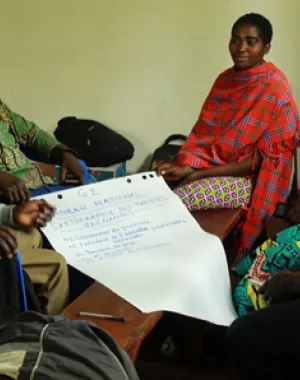Overview
In 2019 War Child started working with two groups of young people living in remote areas near Rutshuru, North Kivu, an area close to the border with Uganda. Both groups decided they wished to address the exploitation and abuse of children working in cattle herding.
The young people felt the use of children as herders was at the root of many tensions in the community such as:
- Tension between farmers, due to crop devastation caused by poor cattle herding which is blamed on the more inexperienced child herders. This also causes issues with local leaders who are accused of favouring some farmers over others when crops are destroyed.
- The parents of the children exploited as herders are angry at the owners of the cattle. They accuse them of being the reason behind their children's ‘flight’ from the families and for them refusing to go to school.
- Farmers often accuse the children and young herders of stealing crops.
- The wider community distrust the child herders. They accuse them of lacking the appropriate ‘way of life’ in society, of rudeness and other abuses that occur (e.g. theft, rape, murder, kidnapping, collaboration with bandits or armed groups etc.).
- The young people also felt poverty, inadequate school structures, difficult conditions limiting access to education and lack of training structures for young people contribute to the proliferation of the issue.
The groups designed and conducted their own research to try and understand how other people in the community felt about children doing this work.
They found that:
- 91% acknowledged cattle were straying wild, due to a lack of farms in the region, and that this was the root of many problems related to the violation of children's rights in the area.
- 80.4% replied that children and young people constitute the most affected demographic of the population for this issue.
- When reflecting who was most likely to be recruited as child herders, children from local families were said to be most affected at 59.8%, children from displaced families were also significantly affected at 28.5%, with returnees' children and children from refugee families least affected (6.1% and 5.5% respectively).
- When asked if there were any efforts being made to address the issue, more respondents felt no effort was being made (47.6%) than was being made (33%). For those who responded effort was being made, however, this was often only referred to local police who use threats or corporal punishment to drive children away.
In August 2021 the group started planning their local advocacy which will take place into early 2022.
Download the full report to read more.

